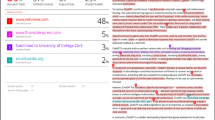Abstract
In this article I discuss the ethical ramifications for medical ethics training of the availability of large language models (LLMs) for medical students. My focus is on the practical ethical consequences for what we should expect of medical students in terms of medical professionalism and ethical reasoning, and how this can be tested in a context where LLMs are relatively easy available. If we continue to expect ethical competences of medical professionalism of future physicians, how much – if at all – should we worry that such generative AI may compromise adequate testing of medical students’ abilities in this regard? I mainly focus on assessment methods based on written assignments of the ‘student paper’ type and consider whether LLMs make it unfeasible for assessors to gauge whether output is student-generated or ‘machine-generated’ and, if so, whether this is a problem. My take on this research question unfolds in three interwoven arguments, claiming that the advent of LLMs may offer a momentum (i) to reaffirm the importance of context-sensitive interpretation and specification of ethical principles in medical ethics training, (ii) to provide more supportive circumstances to assessors to allow them to meet scoring demands entailed by the importance that is placed on medical professionalism, and (iii) to complement written assignments with verbal (group) discussion to train and test students’ skills to habitually recognize that ‘moral solutions’ can be normatively questioned and specified from various perspectives.
Similar content being viewed by others
References
Beauchamp, Tom, and James Childress. 2019. Principles of biomedical ethics. Oxford: Oxford University Press.
Davis, Michael. 1999. Professional responsibility: Just following the rules? Business & Professional Ethics Journal 18: 65–87.
Desai, Mira, and Kapadia Jigar Dilipkumar. 2022. Medical professionalism and ethics. Journal of Pharmacology and Pharmacotherapeutics 13: 113–118.
Favia, Amanda, Lily Frank, Nada Gligorov, Steven Birnbaum, Paul Cummins, Robert Fallar, Kyle Ferguson, Katherine Mendis, Erica Friedman, and Rosamond Rhodes. 2013. A model for the assessment of medical students’ competency in medical ethics. AJOB Primary Research 4: 68–83.
Giubilini, Alberto, Sharyn Milnes, and Julian Savulescu. 2016. The medical ethics curriculum in medical schools: Present and future. The Journal of Clinical Ethics 27: 129–145.
Musschenga, Bert. 2014. Moral expertise – the role of expert judgments and expert intuitions in the construction of (local) ethical theories. In Empirically informed ethics: Morality between facts and norms, ed. Markus Christen, Carel van Schaik, Johannes Fischer, Markus Huppenbauer, and Carmen Tanner, 195–208. Cham: Springer.
Pullman, Daryl. 2005. Ethics first aid: Reframing the role of principlism in clinical ethics education and practice. The Journal of Clinical Ethics 16: 223–229.
Savulescu, Julian, Roger Crisp, Bill Fulford, and Tony Hope. 1999. Evaluating ethics competence in medical education. Journal of Medical Ethics 25: 367–374.
Schöne-Seifert, Bettina. 2006. Danger and merits of principlism. Meta-theoretical reflections on the Beauchamp/Childress-Approach to biomedical ethics. In Bioethics in cultural contexts, ed. Christoph Rehmann-Sutter, Marcus Düwell, and Dietmar Mieth, 109–119. New York: Springer.
Siegler, Mark, Edmund D. Pellegrino, and A. Peter Singer 1990. Clinical medical ethics. The Journal of Clinical Ethics 1: 5–9.
Funding
No funding was received for this work.
Author information
Authors and Affiliations
Corresponding author
Ethics declarations
Conflicts of interests/Competing interests
The author declares no conflict of interest.
Additional information
Publisher’s Note
Springer Nature remains neutral with regard to jurisdictional claims in published maps and institutional affiliations.
Rights and permissions
Springer Nature or its licensor (e.g. a society or other partner) holds exclusive rights to this article under a publishing agreement with the author(s) or other rightsholder(s); author self-archiving of the accepted manuscript version of this article is solely governed by the terms of such publishing agreement and applicable law.
About this article
Cite this article
Segers, S. Why we should (not) worry about generative AI in medical ethics teaching. International Journal of Ethics Education 9, 57–63 (2024). https://doi.org/10.1007/s40889-023-00179-5
Accepted:
Published:
Issue Date:
DOI: https://doi.org/10.1007/s40889-023-00179-5




